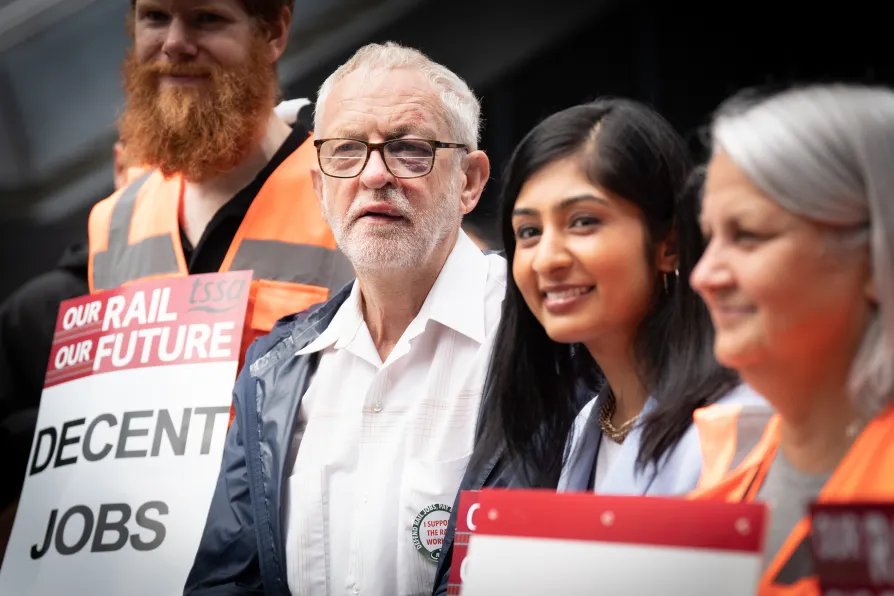Error message
An error occurred while searching, try again later.
 Jeremy Corbyn (second left) and Zarah Sultana, MP for Coventry South (second right) on the picket line outside London Euston train station, August 18, 2022
Jeremy Corbyn (second left) and Zarah Sultana, MP for Coventry South (second right) on the picket line outside London Euston train station, August 18, 2022
GAZA is burning with its population forced into 21st century concentration camps that lack even the shelter and “amenities” that could be found at Buchenwald.
Our Prime Minister has humiliated himself and the nation while trying to get the White House “buffone” to further ramp up conflict on our continent.
And mobs led by 21st century neofascists are trying to take control of the streets, lamppost by lamppost.
The political system, a political duopoly cast in an Establishment consensus and hitherto a factor for capitalist stability, is falling apart with millions on the move for a political alternative to stagnation, inequality and the unchallenged rule of the super-rich.
And the putative leaders of the left-wing alternative so ardently desired by the hundreds of thousands who have signed up for it, and the millions who saw in Labour’s 2017 manifesto a programme of hope and liberation, are arguing ostensibly about who should manage the membership system and bank accounts.
Set aside, however well-grounded, allegations of sexism or complaints about unsanctioned initiatives, this appears as politics Monty Python-style, and it must end if the promise of a renewal of working-class politics is to be realised in a generation.
The mood of impatience at the grassroots level and the seeming paralysis at the top have created a situation where a thousand local initiatives are taking root.
There is an anxiety exhibited by some that, if the lapse in leadership continues, the most unrepresentative and predatory of factions will take control at the local level.
If these fears are at all well-grounded, the remedy is to move as quickly as possible to establish democratic structures that give effect to the policies that millions demand and make this new party a party of mass action that could transform politics as the instrument of the working class in becoming the decisive force in shaping our future.
Hundreds of thousands are anxiously watching this tragic comedy of errors unfold in the hope and expectation that the protagonists in these arcane disputes find agreement.
The plain fact is that, given the depth of the crisis of our economy, the desperate straits of millions of working people and the scale of the far-right threat, the working class and the left need leadership and mass action.
A measure of the possibilities lies in the decisive shift of opinion on Gaza, which has isolated the “genocidaires.” We see in a rising militancy among workers a force to shift the balance of power and wealth in favour of working people.
Even in the uncomfortably wide assembly of opinion currently mobilised to decorate our lampposts (with ultra-cheap foreign-manufactured flags), we can detect a hostility to the status quo and to Starmerism that signifies a deep disillusion with Establishment politics.
It is critically important that the crisis of leadership is resolved and that disagreements at the top are not reproduced at the local level, harden into factional organisation and create barriers to the broad appeal that is the prize that awaits us.
It is vital that the new party be led by people who have the confidence of the many thousands whose hopes are invested in its success.
The combination of Zarah Sultana and Jeremy Corbyn brings together youth and experience, energy and enthusiasm, with an almost unassailable moral authority.
But there are other people engaged in this process of party formation beyond these two who should be accorded respect, authority and a more active role.
Sultana and Corbyn, united in common endeavour, is a powerful pole of attraction for millions, and in as far as antagonistic camps are identified with both, they need to be reconciled, and this entails a spirit of self-criticism and compromise that would set an example to the rest of us.










